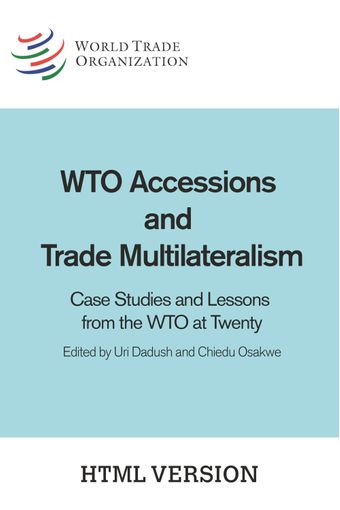Contributions and lessons from WTO accessions: The present and future of the rules-based multilateral trading system

- By: Chiedu Osakwe
- Source: WTO Accessions and Trade Multilateralism , pp 11-11
- Publication Date: January 2015
- DOI: https://doi.org/10.30875/79e97e15-en
- Language: English
WTO accession still holds a magnetic attraction for non-members. Why is this so, in spite of the challenges faced by the organisation, conclusions by analysts of deadlock in the Doha Development Agenda, assessments that trade policy action has shifted elsewhere to preferential trade arrangements (bilateral and regional trade agreements, including more recently, ‘mega-regionals’) and repeated forecasts about the WTO’s ‘irrelevance’ and ‘unravelling’? Systemically, what have WTO accessions contributed to the rules-based trading system through their processes, procedures, best practices and results? What effects have accession negotiations had on domestic reforms in Article XII members? Are there broader lessons for the WTO? This chapter demonstrates that, after the coming into force of the WTO in 1995, results from WTO accession negotiations served to update trade rules continuously (including influencing WTO jurisprudence), enlarged market access opportunities, provided acceding governments with a critical multilateral instrument for legislation-based domestic reforms, and supported geopolitical and geo-economic transformations from centrally planned to market-based economies, the rule of law and good governance. The changes associated with these results were evident from the 1989 fall of the Berlin Wall and the 1991 collapse of the Soviet Union. The evidence strongly suggests that the accession process and its results have established a legal framework for international cooperation, contributed to the global economic transformation of command to market economies and provided a platform for Article XII members to implement their development and modernisation priorities. Overall, the legal, economic and trade policy impact from the deposited Accession Protocols and the process of accession negotiations per se have not only reinforced existing rules and raised the systemic bar, with associated catalytic effect for domestic reforms, but have also staked out the parameters for the future of the rules-based trading system, including a future WTO work programme.
-
From This Site
/content/books/9789287046796s007-c001dcterms_subject,pub_countryId-contentType:WorkingPaperSeries -contentType:Periodical -contentType:BookSeries -contentType:ReportSeries105


